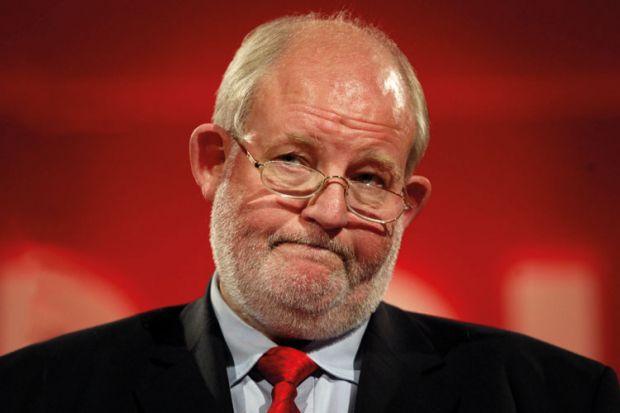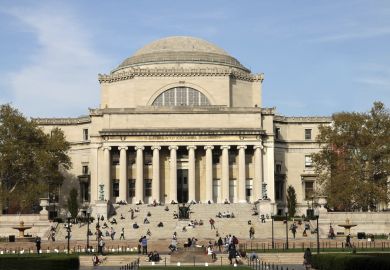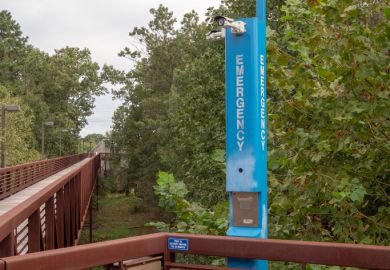Charles Clarke, the architect of top-up fees as Labour’s education secretary under Tony Blair, has a clear view on new party leader Jeremy Corbyn’s aim to abolish tuition fees. His answer to a question on the policy started coming after the words “Jeremy Corbyn” and before Times Higher Education could get to the fees bit.
“He’s going to print money for everything that anybody wants and therefore there are no dilemmas…because the money will be printed,” Mr Clarke said. “It will descend from trees in the sky and we will all live a very pleasant life. So I say hooray for Jeremy Corbyn and our ability to live in this ideal world.”
Eagle-eyed readers may detect the merest trace of sarcasm.
Almost 12 years on from that knife-edge House of Commons vote on top-up fees won by Labour, Mr Clarke has started a new appointment as visiting professor at the Policy Institute at King’s College London, which aims to improve policymaking and the impact of academic research by bringing the two together.
Improbable as it might have seemed in 2004, Labour’s two most vociferous rebel backbenchers in that vote, Mr Corbyn and John McDonnell, have now taken up their posts as party leader and shadow chancellor.
Mr Clarke, who will research the future of government including new ways to pay for public services in his role at King’s, did not save all his fire for the new Labour leaders, who are set to preside over their first party conference in Brighton. He also gave a critique of the “massive mistakes” made by the coalition government in its “unacceptable” fees policy.
But it was his view on Mr Corbyn’s policy to abolish fees and reintroduce maintenance grants, at a stated cost of £10 billion, and the decision to apologise for Labour’s introduction of fees in 1998, that prompted a strong reaction.
“As far as apologies are concerned, I have no apology to make. I believe that the policy we put forward created an income stream for universities which allowed them to grow and expand over the last 10 to 12 years.”
Mr Clarke said that the theory that fees would deter working-class students, advanced “in spades” by Mr Corbyn and Mr McDonnell in 2004, “has been demonstrated to be totally false...in fact the numbers have been increasing”.
On the coalition’s fees and funding policy, Mr Clarke said that it made “a big mistake” in lifting the graduate repayment threshold on loans from £15,000 to £21,000. “That meant the sustainability of the system that I’d established was massively undermined.”
The former Labour minister said that his reforms recognised that there were public and individual benefits from higher education, reflected in the balance of contributions between the two.
“But by cutting the grant to universities so substantially…[the coalition] removed the government’s stake in the whole thing and a recognition of the government’s benefit in a way I think was quite unacceptable,” he added.
Labour’s policy brought “better pay for lecturers, better facilities”, all “paid for as a result of putting in tuition fees on top of that basic level of [government] funding”, he argued.
“I don’t accept the argument that what the government is doing is some extension of what I did,” he added.
David Willetts, the former universities and science minister who created the new system, is also a visiting professor alongside Mr Clarke at the Policy Institute.
“I like David, I respect him a lot,” said Mr Clarke. But, he added, “I think he was wrong in the changes he made and I think in his more candid moments, he would concede his Liberal [Democrat] friends forced him to shift the threshold…in a way which destroyed the fundamental integrity of the system that was there”.
Research: ‘humanities has a part to play’
Charles Clarke recalled that as Labour’s education secretary he “got into a mess…around using the word ‘utility’ in relation to education. I’m still unapologetic about using that word, actually.”
But his comments were “interpreted as saying that I wasn’t in favour of research into the humanities, which is completely untrue”, he said. “It’s completely the opposite of what I think. I profoundly believe humanities [and] social science research is the key missing component in understanding how our society is evolving to deal with all the key challenges of the future.” That was “why I favoured the impact structure” as education secretary, Mr Clarke continued.
Asked if he supported greater research concentration, Mr Clarke said that there were “areas of very great excellence in relatively small institutions. That said, I’ve always been of [the] view that a relatively small number of universities in the country – probably about 30 or 40 out of 150 – are the areas where high-quality research is carried out. And that ought to be recognised and people ought to come clean about that.”
John Morgan
POSTSCRIPT:
Print headline: Corbyn wrong to apologise for Labour fees, says Clarke
Register to continue
Why register?
- Registration is free and only takes a moment
- Once registered, you can read 3 articles a month
- Sign up for our newsletter
Subscribe
Or subscribe for unlimited access to:
- Unlimited access to news, views, insights & reviews
- Digital editions
- Digital access to THE’s university and college rankings analysis
Already registered or a current subscriber? Login




